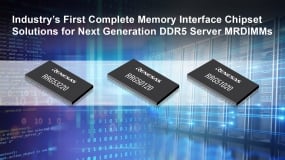TOKYO, Japan ― Renesas Electronics Corporation (TSE: 6723), a premier supplier of advanced semiconductor solutions, today announced that it has delivered the industry’s first complete memory interface chipset solutions for the second-generation DDR5 Multi-Capacity Rank Dual In-Line Memory Modules (MRDIMMs).
The new DDR5 MRDIMMs are needed to keep pace with the ever-increasing memory bandwidth demands of Artificial Intelligence (AI), High-Performance Compute (HPC) and other data center applications. They deliver operating speeds up to 12,800 Mega Transfers Per Second (MT/s), a 1.35x improvement in memory bandwidth over first-generation solutions. Renesas has been instrumental in the design, development and deployment of the new MRDIMMs, collaborating with industry leaders including CPU and memory providers, along with end customers.
Renesas has designed and executed three new critical components: the RRG50120 second-generation Multiplexed Registered Clock Driver (MRCD), the RRG51020 second-generation Multiplexed Data Buffer (MDB), and the RRG53220 second-generation Power Management Integrated Circuit (PMIC). Renesas also offers temperature sensor (TS), and serial presence detect (SPD) hub solutions in mass production, making it the only memory interface company that offers the complete chipset solutions for industry standard next-generation MRDIMMs as well as all other server and client DIMMs.
“The demand for higher performance systems driven by AI and HPC applications is relentless,” said Davin Lee, Senior Vice President and General Manager of Analog & Connectivity and Embedded Processing. “Renesas is at the forefront of this trend, working with industry leaders to develop next-generation technology and specifications. These companies depend on Renesas to deliver the technical know-how and the production capabilities they require to meet unprecedented demand. Our latest chipset solutions for second-generation DDR5 MRDIMMs showcase our leadership in this market.”
Renesas’ RRG50120 second-generation MRCD is used on the MRDIMMs to buffer the Command/Address (CA) bus, chip selects and the clocks between the host controller and DRAMs. It consumes 45% less power compared to the first-generation device, a critical specification for heat management in very high-speed systems. The RRG51020 Gen2 MDB is the other key device used in the MRDIMMs to buffer data from the host CPU to DRAMs. Both the new Renesas MRCD and MDB support speeds up to 12.8 Gigabytes per Second (GB/s). Additionally, Renesas’ RRG53220 next-generation PMIC offers best-in-class electrical-over-stress protection and superior power efficiency and is optimized for high-current and low-voltage operation.
Availability
Renesas is sampling the RRG50120 MRCD, the RRG51020 MDB, and the RRG53220 PMIC now, and expects the new products to be available for production in the first half of 2025. More information on these new products is available at www.renesas.com/DDR5.
About Renesas Electronics Corporation
Renesas Electronics Corporation (TSE: 6723) empowers a safer, smarter and more sustainable future where technology helps make our lives easier. A leading global provider of microcontrollers, Renesas combines our expertise in embedded processing, analog, power and connectivity to deliver complete semiconductor solutions. These Winning Combinations accelerate time to market for automotive, industrial, infrastructure and IoT applications, enabling billions of connected, intelligent devices that enhance the way people work and live. Learn more at renesas.com. Follow us on LinkedIn, Facebook, X, YouTube, and Instagram.
(Remarks) Intel, the Intel logo, and other Intel marks are trademarks of Intel Corporation or its subsidiaries. All names of products or services mentioned in this press release are trademarks or registered trademarks of their respective owners.
The content in the press release, including, but not limited to, product prices and specifications, is based on the information as of the date indicated on the document, but may be subject to change without prior notice.
